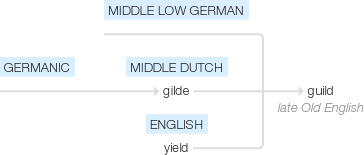Guild
late Old English: probably from Middle Low German and Middle Dutch gilde, of Germanic origin; related to yield.
wiktionary
From Middle English gilde, from Old Norse gildi(“payment, guild”). Related to geld, yield, yauld.
etymonline
guild (n.)
also gild, early 13c., yilde (spelling later influenced by Old Norse gildi "guild, brotherhood"), a semantic fusion of Old English gegield "guild, brotherhood," and gield "service, offering; payment, tribute; compensation," from Proto-Germanic *geldja- "payment, contribution" (source also of Old Frisian geld "money," Old Saxon geld "payment, sacrifice, reward," Old High German gelt "payment, tribute;" see yield (v.)).
The connecting sense is of a contribution or payment to join a protective or trade society. But some look to the alternative prehistoric sense of "sacrifice," as if in worship, and see the word as meaning a combination for religious purposes, either Christian or pagan. The Anglo-Saxon guilds had a strong religious component; they were burial societies that paid for Masses for the souls of deceased members as well as paying fines in cases of justified crime.
The earliest reference was to sacred banquets (Tacit: Germania 21-2) for which a contribution had to be paid, and which furthermore accounts for the meaning 'fraternity' of the formation *geldja-. In medieval times the economically oriented fraternities, the guilds, adopted this word, but it could still be used in reference to religious fraternities .... The contribution to the banquets, *gelda-, acquired a legal meaning 'recompense', but also the meaning 'money, currency' in general. [Dirk Boutkan, "Old Frisian Etymological Dictionary"]
Continental guilds of merchants, incorporated in each town or city and holding exclusive rights of doing business there, arrived after the Conquest. In many cases they became the governing body of a town (compare Guildhall, which came to be the London city hall). Trade guilds arose 14c., as craftsmen united to protect their common interest.
